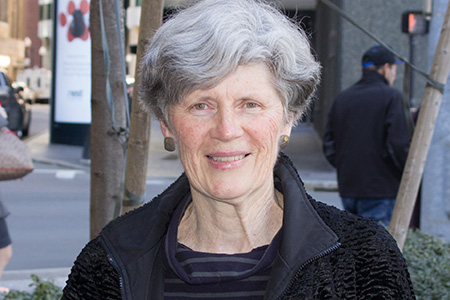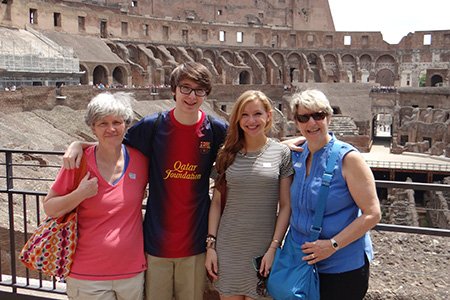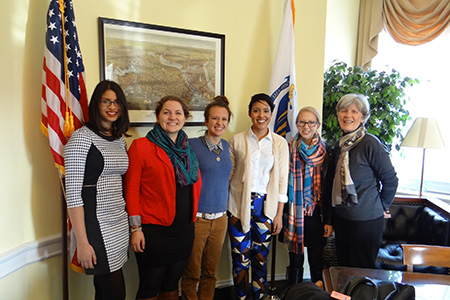Mom of two, Kane ’16 co-leads polling club

Chris Kane ’16 decided to finish her bachelor’s degree later in life at Emerson, where she is majoring in Political Communication and serves as co-president of the Emerson College Polling Society. (Photo by Dan O’Brien)
It’s common for the fellow students of Chris Kane ’16 to mistake her for a professor, but that doesn’t bother her.
“I don’t mind at all,” said the mother of two, who is majoring in Political Communication through the Communication Studies Department. “People are often a little sheepish when I tell them I’m a student, but it’s an understandable mistake.”
Kane, now serving as co-president of the Emerson College Polling Society, studied English and journalism at Syracuse University in the 1970s, but never obtained her degree. She attended Simmons College in the early 1990s until she and her long-term partner, Merry Gerard, had twins, Sam and Abby, causing her to leave school a second time to become the family’s primary breadwinner.
“I have two kids in college right now. I miss them, so it’s fun to be around people in their late teens and early 20s,” Kane said. “It’s a great, really nice group of kids [at Emerson] who are talented and very, very hard working.”

Kane has spent much of her career as a writer, editor, and project manager for clients in the technology industry, higher education, and the nonprofit sector. For the past several years, she has worked as an independent contractor for Libretto, a strategic marketing communications firm in Boston, which is owned by her brother, Neal Kane.
Kane said she became friends with MJ Knoll-Finn, Emerson’s former vice president for enrollment, several years ago—first through a writing project, and later when they were neighbors in Jamaica Plain—and the two remained in touch over the years.
Kane was working on a freelance writing job for Knoll-Finn about four years ago, for Emerson’s Admission Office, when she seriously considered returning to school.
“I did a lot of research on Emerson’s different programs,” Kane said. “I remember thinking that I wish I had been in a political communication program when I was in college.”
“The light went off in my head, and I realized I could do this now,” she said. “MJ encouraged me to apply.”
Kane said her partner, Gerard, “was bugging me for years to go back to school. She’s been so supportive.”
She and Gerard got married on the first day that same-sex marriage was legalized in Massachusetts in May 2004. The couple exchanged vows in an impromptu ceremony—hours after gay marriage was legalized—surrounded by friends and family on the lawn of city hall in Newton, the city where they live.
Kane, whose passion for politics has grown over the years, said she became interested in the Emerson College Polling Society after taking a class taught by Scholar-in-Residence Spencer Kimball, the society’s faculty advisor.
“He’s very knowledgeable about polling and inspires enthusiasm,” she said. “He challenges you to learn as you do. It’s been a great experience.”

Chris Kane ’16, far right, and recent members of the Emerson College Polling Society visit Congressman Michael Capuano’s office. From left: Ash Ramani ’14, Tina Safford ’18, Cabot Lee Petoia ’16, Juliet Albin ’14, and current ECPS co-president Hannah Ritter ’16. (Courtesy Photo)
The polling society conducts about six or seven scientific phone polls each year on a variety of political or societal issues. Recent polls have examined the potential death penalty for admitted Boston Marathon bomber Dzhokhar Tsarnaev, a hypothetical election between Elizabeth Warren and Hillary Clinton, and domestic violence in the National Football League.
The group’s polls often get wide media attention.
“It’s very validating,” Kane said. “It’s a reminder to us as a group that it’s very important to maintain our legitimacy and transparency, and to adhere to the standards of the polling field.”
Kane said she’s learned—both in classes and the polling society—a great deal when it comes to how people form opinions around political issues or current events.
“It’s been very interesting to read social science research about persuasion and people, and how they get locked into their beliefs,” she said. “It’s much harder to change somebody’s view than to influence someone already inclined in a certain direction [politically].”
When it comes to working with students the same age as her children, Kane says she’s made strong connections and feels appreciated.
“I’m square about some things,” she said. “But I do my best. I’ve made some very nice connections. It’s a really good group.”
Categories